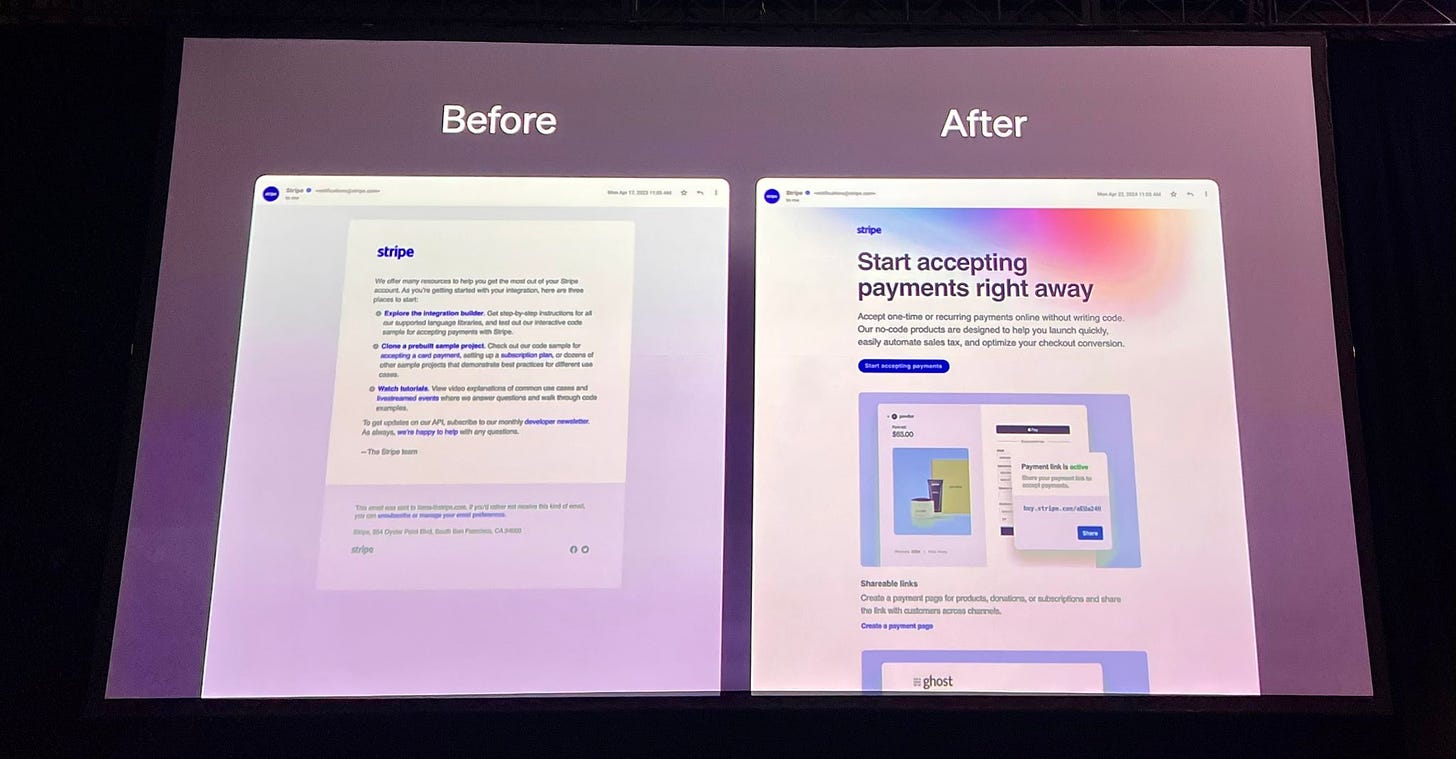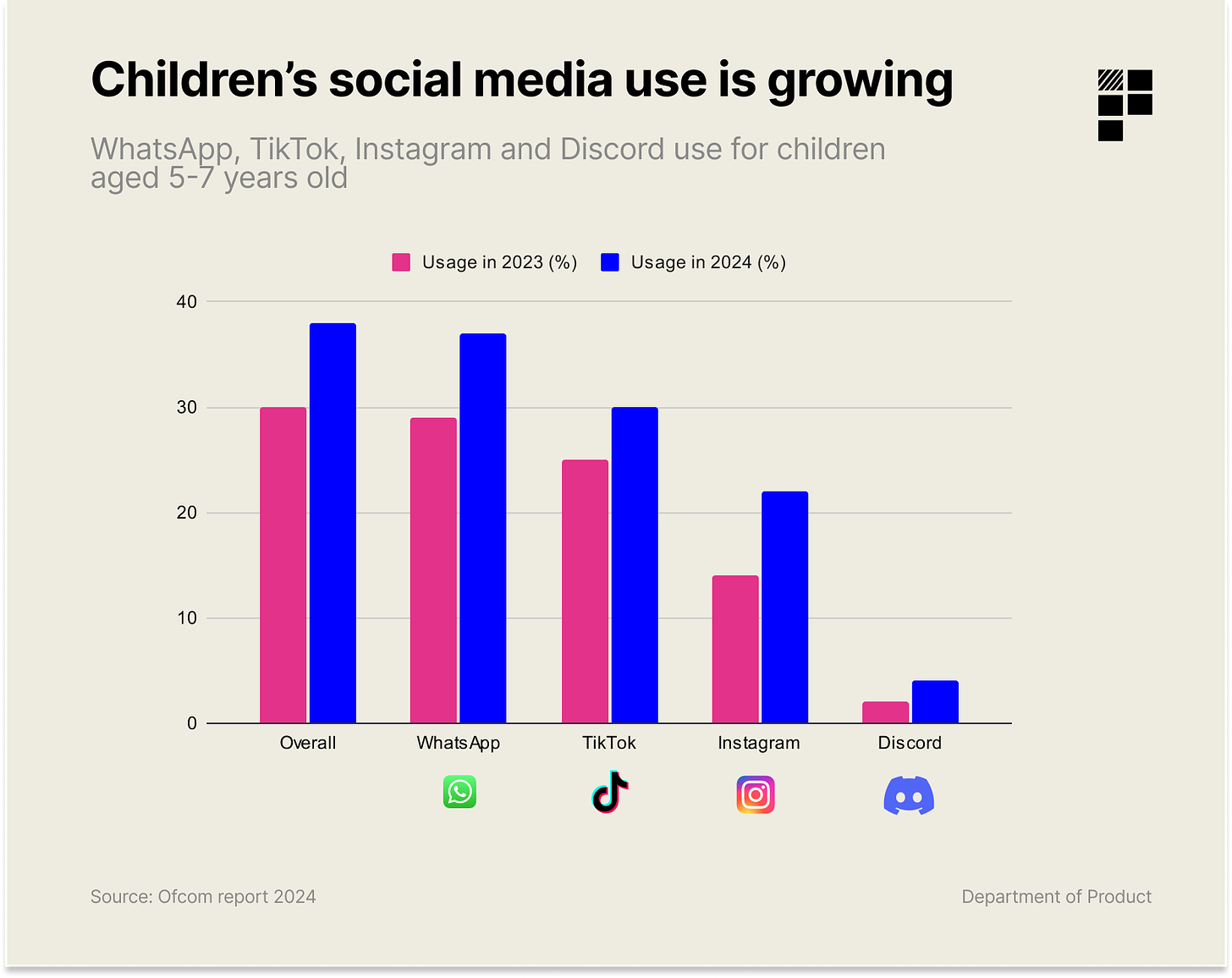Briefing: Stripe’s decoupling, Tinder date sharing and Boom calls
Your weekly briefing - Thursday, 25th April, 2024
Hi product people 👋,
Welcome to the 270+ new subscribers who joined us since last week!
Stripe’s annual Session Conference kicked off yesterday with plenty of new features and announcements for product teams. These include support for new payment methods including Amazon Pay and Revolut, dynamic pricing with local currencies and a series of new embeddable components for payment UIs. One of the major strategic changes that’s coming to Stripe though, is the confirmation that its payments business will be decoupled from other products in its stack which means companies will be able to choose which Stripe products they’d like to use, without necessarily using their core payment API.
Meanwhile, Google challenger Perplexity has announced a brand new product called Perplexity Enterprise Pro which directly targets the segment. As product teams who have worked in B2B SaaS know, the needs of enterprise companies can be very different to smaller businesses which makes the naming of this new product pretty smart.
Around 5.4% of all US businesses are now using AI in some form, up from 3.7% and this is projected to rise to around 6.6% by early Fall 2024. In the poll we ran, nearly 90% of you said you use ChatGPT for work and Perplexity is clearly targeting tech workers with its new offering. Some of the use cases it highlights include marketing teams at Amplitude using it to create reports and product teams at Zoom using its Focus Mode which comes with advanced real-time search capabilities.
In other news, Spotify earnings impressed as it turned a profit and beat earnings estimates but the journey to profitability wasn’t easy. The company laid off over 1500 workers in the last year and Spotify’s CEO said he was surprised by how much the layoff negatively impacted their operations.
And finally, if your work’s Zoom calls feel a little stale these days, why not host a Boom call instead?
Enjoy the rest of your week!
- Rich
Key reads, tools and resources for product teams
New from the Department of Product Substack this week:
Knowledge Series - Monorepos explained
Using examples from companies like Figma, Airtable, Spotify and others, you’ll understand what monorepos are, how they differ from multi-repos and why they matter to engineers and non-engineers alike.
(Department of Product)
UX - How to preserve card details after validation errors in payment design
One of the most problematic and avoidable issues with secured credit card fields is when they get cleared after a form error occurs in nonsensitive fields elsewhere on the page. Senior UX researcher Kathryn Totz explains why forcing users to re-enter this information is problematic. (Baymard Institute)
Hiring trends - How to hire design engineers
Design Engineer is a new role that is gaining popularity—a role that is both confusing and exciting. Expectations for what good software looks and feels like have never been higher. Design Engineers are a core part in exceeding that expectation. In this post, Vercel’s director of design engineering explains what the role is and why it matters. (Vercel Engineering Blog)
Strategy - Do SaaS companies actually have good margins?
The marginal cost of producing a new “unit” of software is zero. For example, last year, 320,000,000 people used Microsoft Teams every month. But how does this play out in reality? (
)Tools you can use
Dart - the ultimate AI project management tool
Retable - an alternative to Airtable
Parloa - a new customer service chatbot company
Intellisay - organise your day by speaking for 2 minutes in the morning
Podcast - How to design products with soul
New product features, launches and announcements this week
Tinder says 51% of its users under 30 already share date details with their friends. So this week, the company decided to turn that insight into a new feature. Share My Date will allow users to share the exact time, date and location of a date for safety purposes.
X is launching a TV app for videos which is ‘coming soon’. The new app will come with features including: enhanced video search, trending videos and multi device casting.
Proton Mail is adding a new dark web monitoring feature that will flag if your email address has been linked to any data leaks, along with some steps you can take to address it. Email seems like a natural fit for this kind of thing and last June they launched their own password manager, too.
OpenAI has launched a series of new API features - many of which could be useful for product teams. These include updates to the Assistants API which is used for building chatbots which such as the ability to limit the number of tokens used per run, improved file searching capabilities which are 500x larger and streaming support for real time, conversational responses. AWS meanwhile, is pitching itself as the go-to place for enterprise customers to store their custom built models using its new AI Bedrock service.
WhatsApp is the latest company to roll out passkeys, which have arrived on iOS. If you’re considering adding passkeys to your product, our Knowledge Series on the topic might help.
Trello has added new features to its core Kanban board product. Colors allow users to brighten up their boards and collapsible lists give users the option to collapse lists that aren’t in use to make it easier to navigate larger boards.
📈 Product data and trends to stay informed
24% of children aged 5-7 have a smartphone and use of social media sites among 5-7 year olds has increased year-on-year. 30% of 5-7 year olds are using TikTok.
At least 47,036 workers at U.S. based tech companies have lost their jobs so far this year, according to a Crunchbase tally. In 2023, approx 191,000 workers were laid off which puts 2024 on roughly the same trajectory.
Product marketers can breathe a sigh of relief, but not for long. Google is delaying the cookie phase out to 2025 to allow more time for industry tests on how the phase out might impact the $600 billion ad industry.
Threads now has 130m monthly active users and now has more DAUs than X.
Digital addiction is quickly becoming the next major focus area for regulators. TikTok recently released a ‘lite’ version which includes a mechanism that allows users to earn points for doing things like watching or liking videos. But, EU regulators have launched a probe into whether the feature introduces risks of addiction. Product teams who are still using ‘hook model’ design patterns to drive up OKRs will need to rethink their approach to ensure any design decisions don’t encourage addictive behaviours - particularly for products targeted at younger users.
AI is using up so much electricity that tech companies are investing in energy startups.

Other product news in brief
Stability AI is laying off around 10% of its workforce.
Amazon is launching a new grocery subscription business in the US.
Netflix earnings impressed but it will be the last time the company reports subscriber numbers.
Alongside the weekly briefing, paid subscribers also get access to the full DoP newsletter stack to feed your product brain and keep you ahead, including The Knowledge Series, Chartpacks and DoP deep dives.
You can learn more about what you get as a paid subscriber or upgrade your newsletter today.
The Department of Product Weekly Briefing is written by Rich Holmes. If you enjoyed this week’s briefing, hit the like ♥️ button below - I’d really appreciate it!





